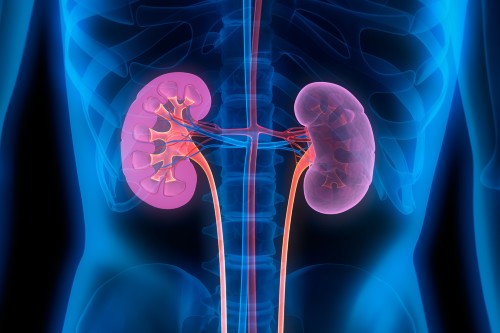
Thousands of people living with rare kidney disease will get access to improved diagnostics, treatments and potentially cures, thanks to the creation of a new research centre, involving experts from the University of Bristol.
In 2023, a major report from Kidney Research UK showed that kidney failure could overwhelm the health care system within ten years. The LifeArc-Kidney Research UK Centre for Rare Kidney Diseases is being launched to provide urgent focus and resource. It will unite researchers, patients and healthcare professionals and build on strong established resources, including the national registry of rare kidney diseases (RaDaR), the national renal sample biobank (NURTuRE) and care guidelines. It will signal the start of a transformation in all of the 13 of the UK's children's kidney centres to embed a culture of research by connecting the systems to accelerate discoveries and advance the treatment of rare kidney diseases.
The new translational centre is jointly funded by the medical research charity, LifeArc, who are investing £9.4 million in partnership with Kidney Research UK which is contributing an additional £1 million to be used to support the work of the centre over the next five years. It will be led by Dr Louise Oni, Senior Lecturer in Paediatric Nephrology at the University of Liverpool and honorary consultant paediatric nephrologist at Alder Hey Children's Hospital.
Dr Louise Oni said: "It is a privilege to be leading this exciting transformation on behalf of the entire kidney community. We are incredibly grateful for the opportunity to establish the LifeArc-Kidney Research UK Centre for Rare Kidney Diseases with the support of our charity partners Kidney Research UK. This UK wide project aims to create a culture of constant learning to bring rapid advances to patients of all ages living with kidney diseases. The project will start by focusing on children with rare kidney diseases to attempt to halt the journey to kidney failure and then upscale into adult patients. Through collaboration, the templates presented by these rare disease centres will support mass transformation to benefit many other patients."
Dr Aisling McMahon, executive director of research at Kidney Research UK, said: "Ensuring that everyone has equal access to innovations and new therapies designed to benefit kidney patients is a key priority for Kidney Research UK. We are delighted to be co-funding this new centre with LifeArc and working in partnership with them and the renal research community to deliver this exciting project. This new collaboration will ensure that patients of all ages with rare kidney diseases not only benefit from new approaches to prevention, diagnosis and treatment, but also become active partners in the research process."
Kathryn Croker faced kidney failure after being diagnosed with the rare disease IgA vasculitis, aged just 13. Following a successful kidney transplant from her dad in 2013, she went on to volunteer with Kidney Research UK and now shares her own experiences to help shape research projects, including this new centre. She said: "If there was a way to treat rare diseases before they get to that point of causing kidney failure and needing a transplant, that would just be incredible because it changes the course of your life. It's exciting to be involved in a project with doctors and researchers focused on kidney disease in children, as typically research involves adults. Hopefully in the next 20 years or less, what I've experienced since childhood will be a thing of the past because I don't want anyone to go through what I have. This new research centre is an exciting opportunity to achieve that."
Moin Saleem, Professor of Paediatric Renal Medicine at Bristol Medical School: Translational Health Sciences (THS) and Director of Bristol Renal, and one of the Bristol leads for the new centre added: "The Bristol team are delighted to be core part of this transformative project. The kidney community in the UK (patients, clinicians, researchers) has several unique world-leading strengths, and is perfectly poised for this collaborative lead from Dr Oni to bring together these resources into a cohesive unit.
"Bristol Renal was the originator of the UK renal rare disease registry as well as the national biobank (NURTuRE), and contributes world-leading translational science in kidney disease. Rare disease requires cooperation above all, and this exciting collaboration will markedly accelerate key scientific and infrastructure advances for the benefit of patients who have a huge unmet need."
The new LifeArc-Kidney Research UK Centre for Rare Kidney Diseases is one of four new centres to be funded by the non-profit medical charity, LifeArc, with the aim of overcoming these barriers that ordinarily prevent new tests and treatments reaching patients. Globally, there are more than 300 million people living with rare diseases. However, rare disease research can be fragmented. Researchers can lack access to specialist facilities, as well as advice on regulation, trial designs, preclinical regulatory requirements, and translational project management, which are vital in getting new innovations to patients.
Dr Catriona Crombie, Head of Rare Disease at LifeArc, continued: "We are extremely proud to be launching four new LifeArc Translational Centres for Rare Diseases. Each centre has been awarded funding because it holds real promise for delivering change for people living with rare diseases. These centres also have the potential to create a blueprint for accelerating improvements across other disease areas, including common diseases."






